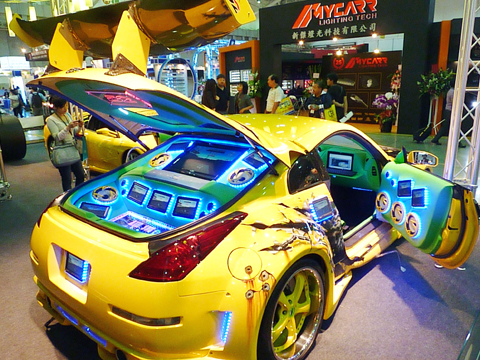With the global economy just emerging from a recession, the Fifth AutoTronics Taipei, which opened yesterday at the Taipei World Trade Center Nangang Exhibition Hall, saw a 6 percent increase in the number of exhibitors this year, thanks to Taiwan’s position in the auto production supply chain, a trade official said.
“Most exhibitions in other countries are shrinking in scale in the aftermath of global economic crisis, but this isn’t the case in Taiwan,” Bureau of Foreign Trade Director-General Huang Chih-peng (黃志鵬) said at the show’s opening.
“This shows Taiwan’s attractiveness thanks to its cluster of suppliers and the overall macroeconomic environment,” he said.

PHOTO: CNA
A total of 1,011 local and foreign companies are participating in the AutoTronics trade show, said the show’s organizer, Taiwan External Trade Development Council (TAITRA, 外貿協會).
This year’s show has attracted participants from 13 countries, including the US, the UK, Indonesia, South Korea and India. Several countries, such as Thailand and the Philippines — have set up national pavilions.
“This year’s Automobile Electronics Show, for the first time, offers an area showcasing electrical and hybrid auto parts,” TAITRA president and CEO Chao Yuen-chuan (趙永全) said.
The area was set up as electric vehicles have become the future trend for the auto industry, he said at the opening ceremony.
“[The area] showcases the technical strength of Taiwan’s R&D and manufacturing ability in lithium-iron batteries, motor modules and other key components for electric vehicles,” Chao said.
Taiwanese firms are increasingly venturing into the growing auto and component market, hoping to create synergy with their Chinese peers to grab a slice of the expanding auto market across the Taiwan Strait.
Aerospace Industrial Development Corp (漢翔航空工業), for one, is displaying two technologies by utilizing its aerospace know-how in vehicle production.
The company is showcasing a network platform that allows seamless network connection among various auto components, and a battery management system and vehicle control unit for easier and safer driving maneuvers.
The two solutions are scheduled for mass production next year, the company said, adding that it has carved a niche in the auto sector with its aerospace experience and strong capability in designing modules, allowing it to respond faster to customer demands.
Taiwan Electrical and Electronic Manufacturers Association (電電公會) chairman Arthur Chiao (焦佑鈞) said Taiwan plays a pivotal role in the global electronics supply chain, and opportunities in the auto industry abound thanks to the booming demand in Asia and steady sales in Europe and the US.
The global automobile electronics market is expected to reach US$176 billion by 2012, Chiao said at the opening.
Huang said the local auto sector was expected to benefit if a proposed economic cooperation framework agreement (ECFA) with China was signed because the transportation sector is included in Taiwan’s early-harvest list.
Huang said Taiwanese companies now have to pay a tariff of about 6 percent for exports of automobiles and related components to China.
The signing of an ECFA is expected to boost the competitiveness of local auto firms, as tariffs may be removed, he said.

Taiwan Semiconductor Manufacturing Co (TSMC, 台積電) last week recorded an increase in the number of shareholders to the highest in almost eight months, despite its share price falling 3.38 percent from the previous week, Taiwan Stock Exchange data released on Saturday showed. As of Friday, TSMC had 1.88 million shareholders, the most since the week of April 25 and an increase of 31,870 from the previous week, the data showed. The number of shareholders jumped despite a drop of NT$50 (US$1.59), or 3.38 percent, in TSMC’s share price from a week earlier to NT$1,430, as investors took profits from their earlier gains

In a high-security Shenzhen laboratory, Chinese scientists have built what Washington has spent years trying to prevent: a prototype of a machine capable of producing the cutting-edge semiconductor chips that power artificial intelligence (AI), smartphones and weapons central to Western military dominance, Reuters has learned. Completed early this year and undergoing testing, the prototype fills nearly an entire factory floor. It was built by a team of former engineers from Dutch semiconductor giant ASML who reverse-engineered the company’s extreme ultraviolet lithography (EUV) machines, according to two people with knowledge of the project. EUV machines sit at the heart of a technological Cold

Taiwan’s long-term economic competitiveness will hinge not only on national champions like Taiwan Semiconductor Manufacturing Co. (TSMC, 台積電) but also on the widespread adoption of artificial intelligence (AI) and other emerging technologies, a US-based scholar has said. At a lecture in Taipei on Tuesday, Jeffrey Ding, assistant professor of political science at the George Washington University and author of "Technology and the Rise of Great Powers," argued that historical experience shows that general-purpose technologies (GPTs) — such as electricity, computers and now AI — shape long-term economic advantages through their diffusion across the broader economy. "What really matters is not who pioneers

TAIWAN VALUE CHAIN: Foxtron is to fully own Luxgen following the transaction and it plans to launch a new electric model, the Foxtron Bria, in Taiwan next year Yulon Motor Co (裕隆汽車) yesterday said that its board of directors approved the disposal of its electric vehicle (EV) unit, Luxgen Motor Co (納智捷汽車), to Foxtron Vehicle Technologies Co (鴻華先進) for NT$787.6 million (US$24.98 million). Foxtron, a half-half joint venture between Yulon affiliate Hua-Chuang Automobile Information Technical Center Co (華創車電) and Hon Hai Precision Industry Co (鴻海精密), expects to wrap up the deal in the first quarter of next year. Foxtron would fully own Luxgen following the transaction, including five car distributing companies, outlets and all employees. The deal is subject to the approval of the Fair Trade Commission, Foxtron said. “Foxtron will be